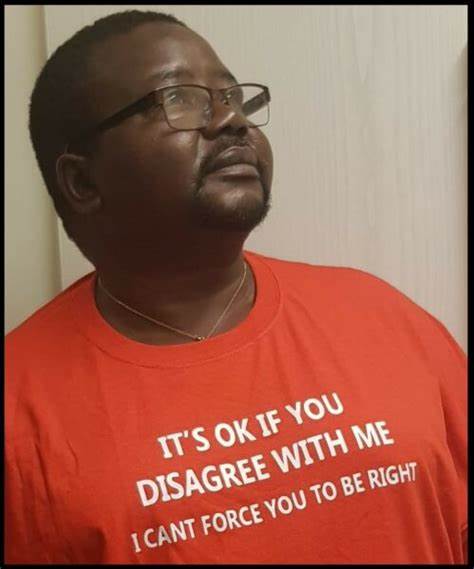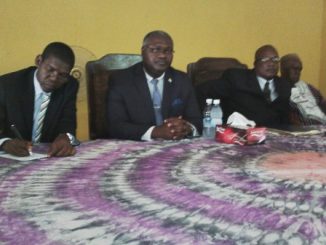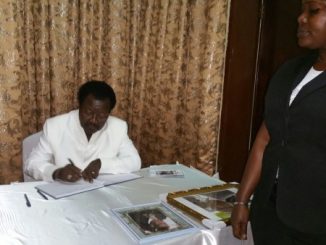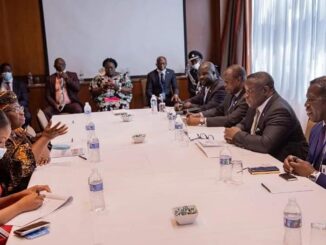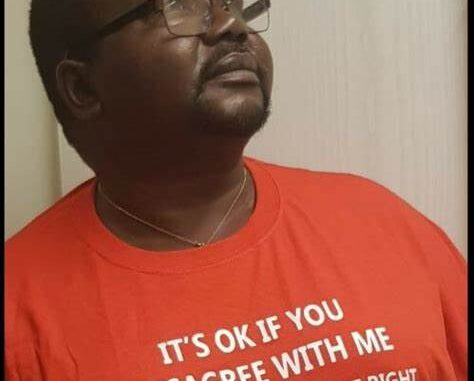
By Abdulai Mansaray
When President Bio assumed power in 2018, he made two prominent promises, among others to the nation. He promised to “fight corruption” and to provide “Free Quality Education”. The promise to fight corruption was nothing new for Sierra Leoneans. President Bio’s predecessors have always used this same mantra to massage the hopes and aspirations of the long-suffering masses.
Unlike his predecessors, President Bio warned us that in the fight against corruption, “corruption will fight back”. As we have witnessed during his first term, that warning has happened. His fight against corruption has been christened severally as a “witch hunt,” “vengeance”, “tribalistic”, nepotism, etc.
Notwithstanding, his bold announcement to give Sierra Leoneans a “Fee Quality Education” did not only hug the headlines but even attracted the attention of the international media. You can recall President Bio’s interview with the BBC on the subject, following which many observers were left in no doubt at the time, that his agenda for free education was little more than a pipe dream.
During an interview with Voice of America (VOA) on 6 October 2021, President Bio stressed that “free education for children is part of his human capital development agenda to improve the lives of the country’s future generation”. When he was quizzed further about how his government would fund such an ambitious agenda, many were left none the wiser by his answers. President Bio plucked some imaginary figures from thin air then, which gave the doom sayers a field day.
It is over five years since that bold announcement and the jury is still out. However, you cannot deny that his Free Quality Education agenda has made significant steps towards achieving some of the most important aspects of his vision. Some mothers point to school food programmes, the access to schools and that they no longer pay fees as pointers to the programme. That does not mean that everything is smooth running, but that’s something to build on.
For starters, his agenda helped to boost the perception that education was a necessary ingredient in human development. In celebrating the International Day of Education, themed “Learning for Lasting Peace” President Bio said on 25/01/24 “My government recognises that education is a human right, a public good, and a responsibility……where every Sierra Leonean child has access to holistic education” (thesierraleonetelegraph.com-26/01/24).
In pursuit of this bold agenda, what is not lost on many Sierra Leoneans is the enormous financial burden the Free Quality Education has saddled the government with. Even the developed western world cannot afford “free education”, not to talk about a debt-ridden country that largely depends on the size of its begging bowl for sustenance. But President Bio has continued to persevere, despite the shortcomings to keep the vision alive. Kudos.
In his second term, President Bio has now embarked on the “Feed Sierra Leone” agenda. This project is grounded in the notion and firm belief that we should be able to feed ourselves, if we “grow what we eat” and “eat what we grow”. Does anyone remember when Sierra Leone used to be a major exporter of produce in West Africa? We did it then and why can’t we do it now?
Can Sierra Leone feed itself?
It is an unequivocal and resounding YES, Sierra Leone can feed itself. As a country, we have the climate, the weather, the land, and the people to feed ourselves. With a land area of 72,182 km Sq. to a population of 8,908,040 (100th), you do the math. Unlike other countries like Somalia, Ethiopia, Kenya etc, that are perennially affected by annual droughts, and do not know when the next rain is going to fall, or when the next locust attack will take place, Sierra Leone is comparatively blessed.
Our climate is tropical, with hot and humid coastal areas on one side, and a more temperate climate inland. Sierra Leone records an average annual temperature of 26.7 C and rainfall of 2,746 mm. Even though nature has been truly kind to us, why have we miserably failed to nurture nature for our own good? The earth has been exceedingly kind to us. All we need is to tickle it with a hoe and it will laugh with a harvest. Why aren’t we?
How can Sierra Leone feed itself?
As Sierra Leoneans, there are numerous, if not numberless things we need to do to achieve self-sufficiency. One of the first things we’ll need is an “aggressive love-fest for all things agricultural”. Once in our life we need a doctor, a lawyer, a postal worker, a policeman, a clergy, and an Imam. But every day, three times a day, we need a farmer. Unfortunately, through perception, we have relegated farming to the lower rungs of human activity.
As a nation, we no longer see farming as the backbone of our economy. Even in schools, students studying agriculture are perceived as intellectually handicapped. The perception of farming as an activity for the less intellectual in the human chain of intelligence needs to change.
In decades gone by, agriculture was so central to our social fabric. Records show that agriculture generated 47.3% of our GDP in the 1090s. We had a government owned and operated Sierra Leone Produce Marketing Board (SLPMB).
Our raw materials like palm oil, palm kernel, piassava, and many others were locally processed for local consumption and export. We made our own soap like 72%, palm oil, palm kernel oil and various byproducts. Our coffee and cocoa were initially roasted and dried before exported to foreign countries. We had SLPMB representatives all over the country, and they were readily available to buy and pay for these products wholesale and throughout the year.
With SLPMB fully functional, what it gave farmers was a guaranteed market to sell their products. Subsequently, the perception of farming was that it was a viable, profitable, and most notably a guaranteed source of income. Mining was also vital, but it never gave the satisfaction or assurance of a guaranteed income because it was a Russian roulette. No one needs a reminder that diamonds are not forever. Ask my cousins at Clerks’ Quarter in Yengema today.
We cannot dismiss the impact our decade long war had on our agricultural sector. The war displaced a large section of the rural population that was forced to relocate to the cities and their environs. Arable land lie in waste all over the country. The war ended two decades ago, and many can no longer remember their way back to their habitual homes. The lure of the city lights remain a hopelessly attractive option. It is no wonder today, that we see hawkers sprawling over the city with just a handful of items that qualify as business ventures.
Make Sierra Leone feed itself again
Sierra Leone needs to make agriculture viable again. We need to rebrand agriculture and make it worthwhile. Growing up in Kono, I still recall the annual agricultural festivals of celebration. There was the Kenema “kakao” show, the Kabala Agricultural Show, the Kono show and many others across the country. It gave farmers the platform to not only bask in the glory of harvests but subconsciously promote the perception of farming as a profitable occupation. The government dished out prices for exceptional produce to individual farmers. Farming became a competition, and this inspired many people into the sector as individuals were annually crowned as “master farmers”.
Those events did not only pass as the equivalent of Chinua Achebe’s Yam Festival but provided the canvas to display our country’s agricultural prowess. One currency that was always evident during those occasions was “PRIDE”. It would be reckless to conclude that Sierra Leone was fully self-sufficient then, but we were not far off the mark.
Politicians like the late S.I. Koroma owned farms personally. I still remember the large swathe of palm oil plantation that bordered the Koya District area, which many said was owned by the late man. That was a symbol of inspiration for the locals…. If S I has a farm, why not me?
If I were the President of Sierra Leone (it’s never a wish), I would make it a compulsory pre-requisite for all members of parliament to own a farm. The don’t have to till the land themselves but all those photo ops of their monthly visit to their farms will go a long way to give some colour to, promotion of and inspiration for agriculture.
As President, I will remove any hint of price control on any locally produced farm products and promote a “if e hart you, go plant you yone” slogan. Call it naïve, dictatorial, utopian or whatever, but we need a drastic approach to “Feed Salone Again”. Farmers are the only people in our economy who buy low and sell high without taking advantage of anyone.
In view of our already overstretched economy, it might sound too much to ask, but our farmers could do with government subsides. If we are to “FEED SALONE” again, advanced agricultural technology, access to markets and efficient supply chains would not be out of place.
If we can promote sustainable farming practices, better access to credit for farmers and promote a holistic approach that involves government policies, social and economic reforms, it will be difficult to see why we cannot “FEED SALONE AGAIN”.
As a nation, we need to have a serious crush on agriculture. We could re-direct our energy to riot and take vengeance and anger on the soil using the hoe, the spade, the machete, and the tractor.
The farmers in western countries like France, Germany and the US are very rich. What we need is to drop our unreasonable romanticism with agriculture and allow investments and technology into the sector. It’s heartening to see President Bio play host to the technical team from the K-Rice Belt Initiative of South Korea recently. Minister of Trade and Industry Mr Ibrahim alpha Sesay, in a recent liaison with UNIDO identified the Feed Salone project and agriculture in general as one of his cornerstone agendas.
Sadly, we complain about the prices of local produce when we could grow our own. Let us bring back those agricultural shows. Let us resuscitate the likes of SLPMB. With better roads these days, we can quickly transport our perishable goods faster. With reforms of land rights, we can enhance the whole agricultural sectors for a coalition of the willing to farm.
We should make our farmers the stewards of the land and entrust them with the responsibility of nourishing it for future generations. Thomas Jefferson once said “agriculture is our wisest pursuit, because it will in the end contribute most to real wealth, good morals, and happiness. If we are to “feed Sierra Leone again”, we should be ready to produce what we consume and consume what we produce. With perseverance and determination, we can make farming our hope. It is time to answer to President Bio’s call to “Feed Salone”.
By the way, can I suggest we call the agenda “FEED SALONE AGAIN”? we did it before, we can do it again. If we can Feed Salone Again and we can Make Salone Sweet Again.
Don’t forget to turn the lights out when you leave the room.

